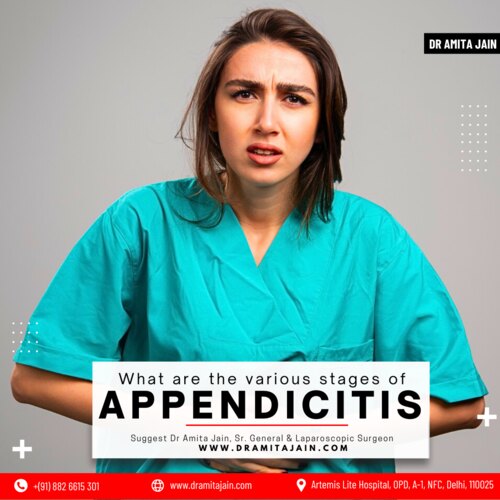Appendicitis is one of the most common causes of acute abdominal pain requiring surgery. When not treated promptly, it can lead to serious health risks. Understanding the stages of appendicitis and the complications related to the appendix can help recognize the condition early and avoid life-threatening outcomes, says Dr Amita Jain, a leading laparoscopic surgeon and one of the best doctors and surgeons for appendicitis treatment in Delhi.
What is Appendicitis?
Appendicitis is the inflammation of the appendix, a small, finger-like pouch attached to the large intestine in the lower right side of the abdomen. Though its function isn’t fully clear, the appendix can become blocked by stool, infection, or foreign bodies, leading to swelling and infection. This blockage increases pressure inside the appendix, cuts off blood flow, and may cause tissue death or rupture. Appendicitis can occur at any age but is most common in people between 10 and 30 years old, shares Senior General and Laparoscopic surgeon Dr Amita Jain.
What are the Stages of Appendicitis?
Early or Catarrhal Stage – In the first 6–12 hours, the appendix becomes inflamed and swollen due to obstruction. Symptoms may include vague abdominal pain near the belly button, nausea, loss of appetite, and mild discomfort.
Suppurative Stage – Over the next 12–24 hours, bacteria multiply inside the appendix, causing pus formation. Pain localizes to the lower right abdomen (McBurney’s point). Patients may experience fever, worsening tenderness, and rebound pain when pressure is released.
Gangrenous Stage – After 24–48 hours, the appendix loses its blood supply and starts to die (necrosis). Severe constant pain, high fever, and a toxic appearance may occur.
Perforated Stage – Without treatment, the appendix can rupture, spilling infected material into the abdominal cavity. This stage usually develops within 48–72 hours. Pain may temporarily lessen as pressure is relieved, but the infection spreads rapidly, leading to peritonitis (inflammation of the abdominal lining).
Complications Related to the Appendix – If appendicitis is not treated quickly, it can cause several serious complications:
Peritonitis – The most dangerous complication. A ruptured appendix releases bacteria and pus into the abdomen, causing widespread infection. Patients develop severe pain, a rigid abdomen, high fever, and sometimes sepsis—a life-threatening response to infection.
Appendiceal Abscess – Sometimes, the body tries to contain the infection by forming an abscess around the burst appendix. This pocket of pus may need to be drained before surgery can safely remove the appendix.
Sepsis – When bacteria from a ruptured appendix enter the bloodstream, they can trigger sepsis. This can lead to organ failure and death without urgent medical intervention.
Intestinal Obstruction – Chronic inflammation or scarring from appendicitis can block the intestine, causing vomiting, severe bloating, and inability to pass stool or gas.
Portal Pylephlebitis – A rare but serious infection of the portal vein that carries blood from the intestines to the liver.
Conclusion
Appendicitis progresses rapidly through predictable stages, and early diagnosis is essential to prevent complications. If you or someone you know has sudden abdominal pain—especially in the lower right side—seek medical care immediately. Prompt surgical removal of the appendix (appendectomy) remains the standard treatment and is highly effective in preventing serious outcomes.

Dr Amita Jain is one of the most experienced and highly skilled general and laparoscopic surgeons in Delhi and India. Known for her exceptional surgical precision and patient-first approach, she offers expert care across a wide range of procedures, using both open and minimally invasive techniques to ensure faster recovery and better outcomes. Dr Amita Jain holds 28 plus years of rich experience in Trauma and General Laparoscopic Surgeries (including Gallbladder stone removal, appendix removal, hernia repair surgery, piles and fissure surgeries). She was the Professor Surgery of at the Army College of Medical Sciences. In 1994 she was commissioned as Surgeon under the United Nations Mission in Congo. From 2020 to 2022, she worked with Bansals Hospital. Currently, Dr Amita Jain is the Sr. General and Laparoscopic Surgeon at Rainbow Children Hospitals, Malviya Nagar, Delhi.
As a top female surgeon in Delhi, Dr Amita Jain brings decades of experience, compassion, and a commitment to surgical excellence. She has undergone advanced training in trauma surgery and has successfully performed numerous complex procedures, including life-saving surgeries, vascular repairs, mangled limb reconstructions, and critical care surgeries. Whether it’s a planned surgery or an emergency situation, patients across Delhi trust Dr Amita Jain for her expertise, integrity, and results-driven approach to general and laparoscopic surgery.
Call Us at +(91) 882-6615301

